|
|
|
Sort Order |
|
|
|
Items / Page
|
|
|
|
|
|
|
| Srl | Item |
| 1 |
ID:
175123
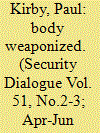

|
|
|
|
|
| Summary/Abstract |
It is today common to argue that rape is a weapon, tool or instrument of warfare. One implication is that armed groups marshal body parts for tactical and strategic ends. In this article, I interrogate this discourse of embodied mobilization to explore how body weaponry has been made intelligible as a medium for sexual violence. First, I show that, despite wide rejection of essentialist models, the penis and penis substitutes continue to occupy a constitutive role in discussions of sexual violence in both political and academic fora, where they are often said to be like weapons, a tendency I term ‘weapon talk’. Second, I trace the image of the body weapon in key threads of feminist theorizing and commentary, to show how the penis has appeared as a ‘basic weapon of force’ in various permutations. Third, I explore the weaponization of the body as it appears in military thought and in the cultural circulation of ideas about the soldiering body in which sexual pleasure and violence are frequently conflated. Building on this foundation, I propose that these literatures collectively describe an uncanny weapon object, and I draw out the significance of this term for feminist security studies and martial empiricism. In short, the uncanny haunts accounts of sexual violence in the collision of sexuality and machinery in the image of a body weapon, in the unsettling designation of sexuality as itself both familiar and dangerous, and in the strange movement of violent bodies across the boundary between wartime and peacetime. A concluding discussion draws out implications and challenges for thinking about embodied violence, advocating renewed attention to the history of weaponization as a fallible and confounding process.
|
|
|
|
|
|
|
|
|
|
|
|
|
|
|
|
| 2 |
ID:
157876
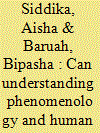

|
|
|
|
|
| Summary/Abstract |
We draw on scholarly literature on the phenomenology of power and disability to understand both the impact of acid violence upon survivors’ lives and the motivations of perpetrators. We employ a human capabilities approach, espoused by prominent development theorists such as Amartya Sen and Martha Nussbaum, to propose policy responses and support systems based not solely on the provision of financial and material resources, but also on improving the social position of acid violence survivors. We show how engaging simultaneously with these frameworks will help move the political and philosophical discourse on acid violence forward and also enable us to frame more responsive and enabling policies to support survivors.
|
|
|
|
|
|
|
|
|
|
|
|
|
|
|
|
| 3 |
ID:
091974
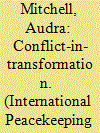

|
|
|
|
|
| Publication |
2009.
|
| Summary/Abstract |
Conflict transformation, and the 'liberalizing peace' paradigm of which it is a part, applies a specific ethos of transformation to the project of peacebuilding. This ethos reshapes conflict and the ways in which it is manifested. An ethico-phenomenological approach is used here to examine the phenomenon of 'conflict-in-transformation' (as opposed to 'peace') that this creates. To this end, the ethical critiques of Charles Taylor, the literature on 'emancipatory' forms of peacebuilding and the European Union's Programmes for Peace and Reconciliation in Northern Ireland are examined. This analysis is applied to phenomena of conflict-in-transformation in post-1998 Northern Ireland. In examining this case, the article highlights how an ethico-phenomenological approach can help to identify the (new) forms of conflict engendered by the liberalizing peace paradigm, with a view to transcending these through the development of new directions in theory and practice.
|
|
|
|
|
|
|
|
|
|
|
|
|
|
|
|
| 4 |
ID:
160099
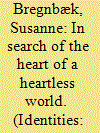

|
|
|
|
|
| Summary/Abstract |
In this article I shed light on the phenomenon of Chinese young people’s conversion to Christianity and argue that it is often closely tied to a utopian longing for what is missing in their lives (Bloch 1907). Through a person-centered account of two young people, I explore their quests to escape the temporal predicament of endless striving 'fuzao' and search for a better life based autotelic values abroad. Paraphrasing Marx I argue that they are in search of ‘the heart of a heartless world’ and argue that they can be seen as individual quests to find hope through more fulfilling forms of human sociality. Arguing that human experience is transitory and illusory in the same way that selves are not stable bounded entities but rather multiple and unstable, I argue that utopia is never fully achieved since it is essentially ‘no-where’.
|
|
|
|
|
|
|
|
|
|
|
|
|
|
|
|
| 5 |
ID:
158423
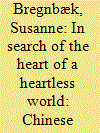

|
|
|
|
|
| Summary/Abstract |
In this article I shed light on the phenomenon of Chinese young people’s conversion to Christianity and argue that it is often closely tied to a utopian longing for what is missing in their lives (Bloch 1907). Through a person-centered account of two young people, I explore their quests to escape the temporal predicament of endless striving 'fuzao' and search for a better life based autotelic values abroad. Paraphrasing Marx I argue that they are in search of ‘the heart of a heartless world’ and argue that they can be seen as individual quests to find hope through more fulfilling forms of human sociality. Arguing that human experience is transitory and illusory in the same way that selves are not stable bounded entities but rather multiple and unstable, I argue that utopia is never fully achieved since it is essentially ‘no-where’.
|
|
|
|
|
|
|
|
|
|
|
|
|
|
|
|
| 6 |
ID:
164288
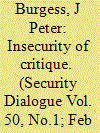

|
|
|
|
|
| Summary/Abstract |
‘Security’ is a uniquely rich object for critique. It rests on a long and noble conceptual history in Western thought. And yet the provision of security most often consists of a shoring up, through the discourses of nationality, ethnicity, political economy or even science, of what is assumed to be solid at its core but weakened through the contingencies of politics, society, ideology, and so on. The article argues that the critical force of critique stems from the fact that critique itself is a practice inescapably bound up with insecurity, and thus that the critique of security exercised since around 1997 as ‘critical security studies’ is self-replicating. By introducing concepts from Husserlian phenomenology, it attempts to show that insecurity is not a simple feature of an otherwise secure state of life, ripe for critical analysis that promises to expose its false premises. Rather, insecurity lies at the very foundation of critical thought. Building upon the bare and basic question, ‘What does it mean to mean?’, a phenomenology of security asks the straightforward question: ‘What is the security-ness of security?’ It permits one to ask what remains of security when all else is stripped away, what essential minimum must be retained in order for security to be security.
|
|
|
|
|
|
|
|
|
|
|
|
|
|
|
|
| 7 |
ID:
027501
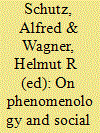

|
|
|
|
|
| Publication |
Chicago, University of Chicago Press, 1970.
|
| Description |
viii, 327p.
|
| Series |
Heritage of sociology
|
|
|
|
|
|
|
|
|
|
|
|
Copies: C:1/I:0,R:0,Q:0
Circulation
| Accession# | Call# | Current Location | Status | Policy | Location |
| 007281 | 301/WAG 007281 | Main | On Shelf | General | |
|
|
|
|
| 8 |
ID:
178860
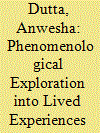

|
|
|
|
|
| Summary/Abstract |
The Bodoland Territorial Autonomous Districts (BTAD) in the state of Assam in Northeast India can be described as a landscape of terror since the area has been a stage for recurrent, mostly violent contestations along ethno-religious lines for more than four decades. Over the years, the violence has claimed more than a thousand lives and displaced millions. Using a multi-sited ethnography carried out over more than eleven months of fieldwork in the region, this paper looks at the everyday lives of those affected by the conflict and critiques the notion of spectacular resistance and exceptionalism in the context of Northeast India. This is done by using a phenomenology of lived experience framework to pay closer attention to the distinctly ordinary ways in which populations survive and endure states of dispossession, displacement and abandonment.
|
|
|
|
|
|
|
|
|
|
|
|
|
|
|
|
| 9 |
ID:
182569
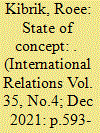

|
|
|
|
|
| Summary/Abstract |
This paper proposes a typology of four possible states of concepts: unquestioned, contested, essentially contested, and destabilized. The typology serves as a frame of reference and as an analytical tool for IR researchers who wish to study concepts and conceptualizing processes as a way of understanding politics. It argues that, within a context, every concept is in one out of four possible states. The typology rests on the relationship between experiences, perceptions, and concepts, aiming to rectify the lacuna of minimal attention to the experiences of many IR works which mainly focus on the inter-subjective sphere and actor-structure tensions. Thus, using the example of sovereignty in Jerusalem during the Israeli-Palestinians negotiations (1993–2001), a new state of concept, the destabilized state, is introduced.
|
|
|
|
|
|
|
|
|
|
|
|
|
|
|
|
| 10 |
ID:
138756
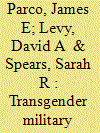

|
|
|
|
|
| Summary/Abstract |
This study is the first to systematically inquire into the lives of transgender men and women currently serving across the branches of the US military in the post-‘‘Don’t Ask, Don’t Tell’’ (DADT) repeal era. We employed an interview protocol from a stratified convenience sample (n ¼ 14) of clandestinely serving active duty, guard and reserve military members from the US Army, Navy, Air Force, and Marine Corps who self-identified as transgender or transsexual. Using phenomenology as a methodological foundation, we present a revelatory case study based on lived experiences from firsthand accounts furthering the collective understanding of gender dysphoria in a contemporary military context.
|
|
|
|
|
|
|
|
|
|
|
|
|
|
|
|
| 11 |
ID:
104060
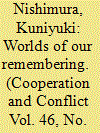

|
|
|
|
|
| Publication |
2011.
|
| Summary/Abstract |
Attempts to deal with the agent-structure problem have often resulted in the introduction of alternative forms of structuralism. Scholars have thus failed to observe the construction and reconstruction of subjectivity, which occurs as an eternal process because of the simple fact that each of us lives in his or her own time. This article attempts to provide an alternative approach to the agent-structure problem by reformulating it as an issue of identity. Especially in comparison with Lévinas, Ricoeur's thought of memory proves helpful in grappling with the problem, not by presupposing the coherent entity of either agent or structure, but by directing our attention to the in-between. It also enables a nuanced analysis of social change, which always needs to be comprehended in its tension with the leanings toward stability. A brief analysis of the literary discourses after the Great War illustrates this point. As a whole, the article aims to recover beings' temporality at the centre of the agent-structure problem and thus reconstruct the problem as innately unstable agents' search for their constantly changing identity.
|
|
|
|
|
|
|
|
|
|
|
|
|
|
|
|
|
|
|
|
|